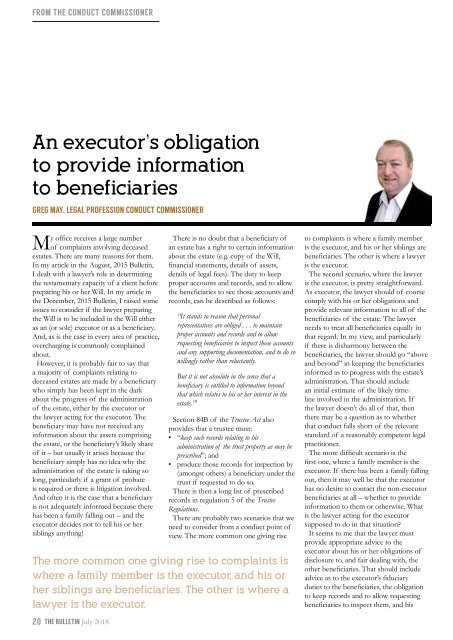LSB July 2018_Web
You also want an ePaper? Increase the reach of your titles
YUMPU automatically turns print PDFs into web optimized ePapers that Google loves.
FROM THE CONDUCT COMMISSIONER<br />
An executor’s obligation<br />
to provide information<br />
to beneficiaries<br />
GREG MAY, LEGAL PROFESSION CONDUCT COMMISSIONER<br />
My office receives a large number<br />
of complaints involving deceased<br />
estates. There are many reasons for them.<br />
In my article in the August, 2015 Bulletin,<br />
I dealt with a lawyer’s role in determining<br />
the testamentary capacity of a client before<br />
preparing his or her Will. In my article in<br />
the December, 2015 Bulletin, I raised some<br />
issues to consider if the lawyer preparing<br />
the Will is to be included in the Will either<br />
as an (or sole) executor or as a beneficiary.<br />
And, as is the case in every area of practice,<br />
overcharging is commonly complained<br />
about.<br />
However, it is probably fair to say that<br />
a majority of complaints relating to<br />
deceased estates are made by a beneficiary<br />
who simply has been kept in the dark<br />
about the progress of the administration<br />
of the estate, either by the executor or<br />
the lawyer acting for the executor. The<br />
beneficiary may have not received any<br />
information about the assets comprising<br />
the estate, or the beneficiary’s likely share<br />
of it – but usually it arises because the<br />
beneficiary simply has no idea why the<br />
administration of the estate is taking so<br />
long, particularly if a grant of probate<br />
is required or there is litigation involved.<br />
And often it is the case that a beneficiary<br />
is not adequately informed because there<br />
has been a family falling out – and the<br />
executor decides not to tell his or her<br />
siblings anything!<br />
20 THE BULLETIN <strong>July</strong> <strong>2018</strong><br />
There is no doubt that a beneficiary of<br />
an estate has a right to certain information<br />
about the estate (e.g. copy of the Will,<br />
financial statements, details of assets,<br />
details of legal fees). The duty to keep<br />
proper accounts and records, and to allow<br />
the beneficiaries to see those accounts and<br />
records, can be described as follows:<br />
“It stands to reason that personal<br />
representatives are obliged . . . to maintain<br />
proper accounts and records and to allow<br />
requesting beneficiaries to inspect those accounts<br />
and any supporting documentation, and to do so<br />
willingly rather than reluctantly.<br />
But it is not absolute in the sense that a<br />
beneficiary is entitled to information beyond<br />
that which relates to his or her interest in the<br />
estate.” 1<br />
Section 84B of the Trustee Act also<br />
provides that a trustee must:<br />
• “keep such records relating to his<br />
administration of the trust property as may be<br />
prescribed”; and<br />
• produce those records for inspection by<br />
(amongst others) a beneficiary under the<br />
trust if requested to do so.<br />
There is then a long list of prescribed<br />
records in regulation 5 of the Trustee<br />
Regulations.<br />
There are probably two scenarios that we<br />
need to consider from a conduct point of<br />
view. The more common one giving rise<br />
The more common one giving rise to complaints is<br />
where a family member is the executor, and his or<br />
her siblings are beneficiaries. The other is where a<br />
lawyer is the executor.<br />
to complaints is where a family member<br />
is the executor, and his or her siblings are<br />
beneficiaries. The other is where a lawyer<br />
is the executor.<br />
The second scenario, where the lawyer<br />
is the executor, is pretty straightforward.<br />
As executor, the lawyer should of course<br />
comply with his or her obligations and<br />
provide relevant information to all of the<br />
beneficiaries of the estate. The lawyer<br />
needs to treat all beneficiaries equally in<br />
that regard. In my view, and particularly<br />
if there is disharmony between the<br />
beneficiaries, the lawyer should go “above<br />
and beyond” in keeping the beneficiaries<br />
informed as to progress with the estate’s<br />
administration. That should include<br />
an initial estimate of the likely timeline<br />
involved in the administration. If<br />
the lawyer doesn’t do all of that, then<br />
there may be a question as to whether<br />
that conduct falls short of the relevant<br />
standard of a reasonably competent legal<br />
practitioner.<br />
The more difficult scenario is the<br />
first one, where a family member is the<br />
executor. If there has been a family falling<br />
out, then it may well be that the executor<br />
has no desire to contact the non-executor<br />
beneficiaries at all – whether to provide<br />
information to them or otherwise. What<br />
is the lawyer acting for the executor<br />
supposed to do in that situation?<br />
It seems to me that the lawyer must<br />
provide appropriate advice to the<br />
executor about his or her obligations of<br />
disclosure to, and fair dealing with, the<br />
other beneficiaries. That should include<br />
advice as to the executor’s fiduciary<br />
duties to the beneficiaries, the obligation<br />
to keep records and to allow requesting<br />
beneficiaries to inspect them, and his


















